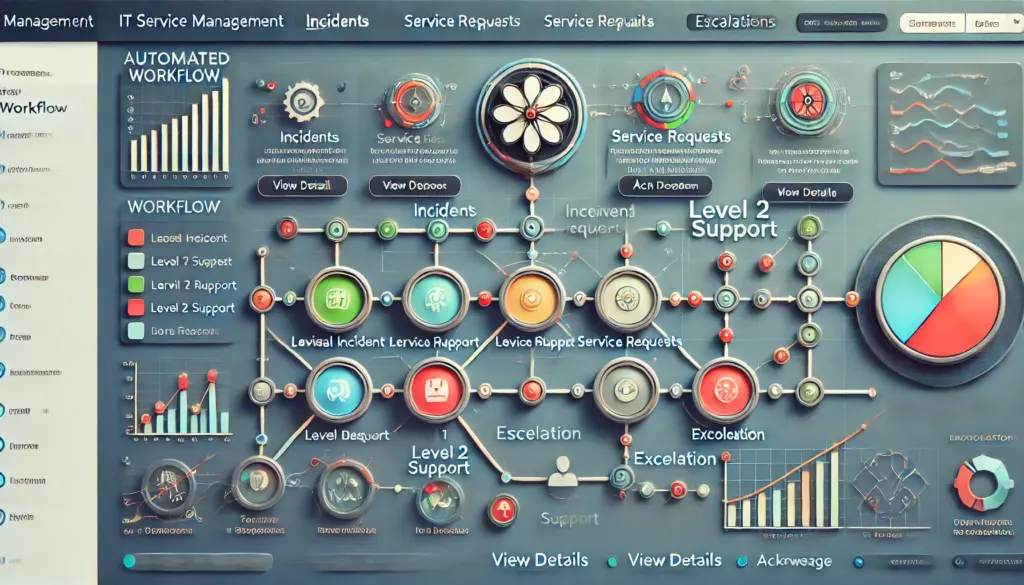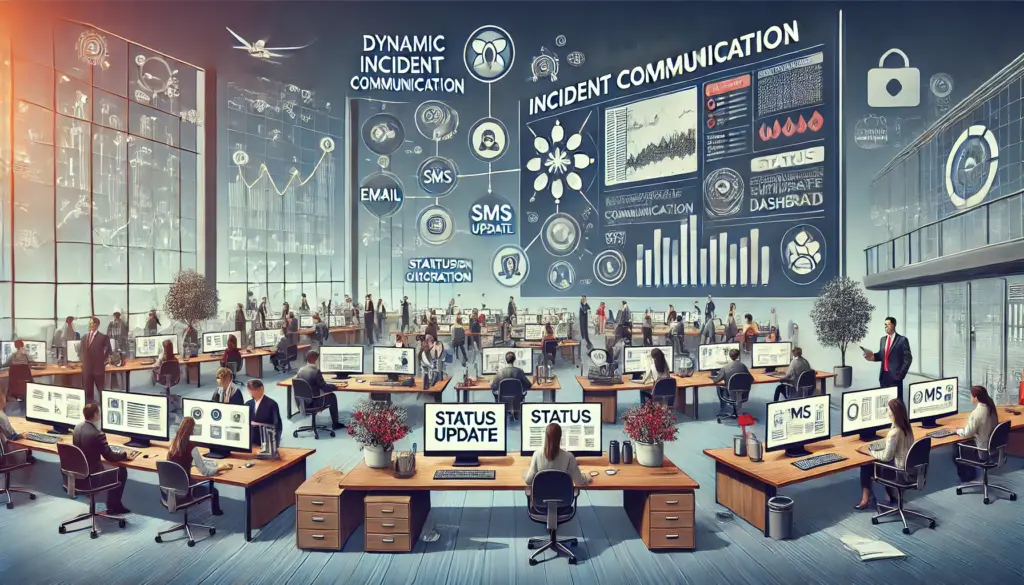The Role of Incident Managers in Business Continuity Planning 🚀
Introduction 🌍
Business Continuity Planning (BCP) is essential for organizations to survive disruptions, whether caused by cyberattacks, natural disasters, or system failures. One of the key roles in ensuring seamless business operations during crises is that of the Incident Manager. But what exactly do they do, and how do they contribute to BCP? 🤔
In this blog, we’ll explore: ✅ The responsibilities of an Incident Manager in BCP
✅ How they prepare businesses for unexpected incidents
✅ Best practices for Incident Managers in ensuring business continuity
✅ Tools and technologies that assist in Incident Management
✅ Case studies of effective BCP implementation
✅ Future trends in Incident Management and Business Continuity
Let’s dive deep into this critical role! 🔍

Understanding Business Continuity Planning (BCP) 🏢
What is Business Continuity Planning?
BCP is a proactive approach to ensuring that an organization can continue its critical functions during and after a crisis. It includes: ✔ Identifying potential risks 🛑
✔ Creating response strategies 📄
✔ Ensuring minimal downtime ⏳
✔ Developing recovery plans 🔄
✔ Conducting ongoing testing and improvements 🔍
BCP is not just an IT strategy—it applies to every aspect of a business, including finance, human resources, supply chains, and customer service. A well-designed BCP ensures that an organization remains functional and continues to provide essential services to its clients and stakeholders.
Why is BCP Important?
A robust BCP strategy helps organizations: ✅ Maintain customer trust and brand reputation 🏆
✅ Reduce financial losses due to unexpected disruptions 💰
✅ Minimize downtime and operational impact ⏳
✅ Comply with industry and government regulations 📜
✅ Improve overall organizational resilience 🔥
👉 Without BCP, businesses risk losing credibility, revenue, and even their ability to operate! Companies that lack a business continuity strategy often struggle to recover from significant disruptions, leading to long-term negative consequences.
Who is an Incident Manager? 🧑💼
Incident Manager’s Role in an Organization
An Incident Manager is responsible for handling unexpected IT and operational disruptions. Their role in BCP involves: 📌 Identifying and assessing incidents 📊
📌 Coordinating response efforts across departments 🛠
📌 Communicating with stakeholders 📞
📌 Ensuring swift recovery and minimal impact ⏩
📌 Documenting incidents for future prevention 📑
📌 Conducting post-incident reviews and improvements 📋
Incident Managers act as the first responders in an organization’s crisis response framework. They play a pivotal role in ensuring that issues are resolved quickly and efficiently to maintain business operations. Their responsibilities extend beyond just IT issues—they handle anything that disrupts business functions, from cybersecurity breaches to natural disasters.
Key Responsibilities in Business Continuity Planning
Incident Managers play a crucial role in BCP by:
🔹 Risk Assessment & Mitigation: Evaluating potential threats and implementing preventive measures.
🔹 Incident Response Coordination: Managing incident resolution teams and ensuring rapid response.
🔹 Communication & Stakeholder Management: Keeping leadership and employees informed during incidents.
🔹 Testing & Simulations: Conducting regular drills to assess BCP effectiveness.
🔹 Continuous Improvement: Learning from past incidents to improve future responses.
🔹 Compliance & Regulatory Adherence: Ensuring that the company meets legal and regulatory requirements.
How Incident Managers Strengthen BCP 🔥
1️⃣ Proactive Risk Identification & Assessment
Incident Managers analyze past incidents and industry trends to identify risks before they occur. They collaborate with security teams to strengthen defenses and prevent downtime. This includes:
✔ Conducting risk assessments and impact analyses
✔ Establishing a risk register and maintaining an updated database
✔ Working with cybersecurity teams to mitigate IT threats
✔ Addressing physical security risks, such as workplace hazards
2️⃣ Effective Incident Response & Coordination
When an incident occurs, Incident Managers: 🚨 Activate response teams
📢 Notify stakeholders and employees
🛠 Implement recovery procedures
📊 Monitor resolution progress
🔍 Conduct real-time incident tracking
Their ability to make quick decisions and implement emergency response plans is crucial in minimizing damage and ensuring a smooth recovery process.
3️⃣ Seamless Communication During a Crisis
Communication breakdowns can worsen a crisis. Incident Managers ensure that: 📣 All teams receive real-time updates
📩 Customers and partners are informed
🔄 Misinformation is avoided
✔ Clear escalation paths are defined
✔ External communication is managed professionally
4️⃣ Disaster Recovery & Post-Incident Analysis
After an incident, the Incident Manager: 📁 Documents root causes
🔄 Suggests improvements
📋 Updates BCP plans accordingly
📈 Tracks long-term trends for process enhancement
This continuous learning approach helps organizations strengthen their business continuity strategies over time.
Best Practices for Incident Managers in BCP 🏆
To excel in Business Continuity Planning, Incident Managers should:
✅ Develop a Clear Incident Management Framework A structured approach ensures consistency in handling disruptions.
✅ Conduct Regular Drills & Simulations Simulated crisis scenarios help test and improve BCP strategies.
✅ Leverage Advanced Monitoring Tools Using tools like New Relic, Grafana, or Splunk enables real-time incident detection.
✅ Foster a Culture of Resilience Encourage teams to stay prepared and adapt to unexpected challenges.
✅ Collaborate with Cross-Functional Teams BCP is not just an IT concern—HR, legal, and operations teams must be involved.
✅ Ensure Compliance with Regulations Incident Managers should stay updated on regulatory requirements to prevent legal consequences.
Case Studies: Effective Incident Management in Action 📚
🔹 Case Study 1: Financial Institution Cyberattack Response How a major bank successfully mitigated a cyberattack through rapid response and strong BCP measures.
🔹 Case Study 2: Natural Disaster Recovery in a Retail Chain How an international retailer resumed operations quickly after a hurricane disrupted supply chains.
Future Trends in Incident Management & BCP 🚀
🔹 AI and automation for faster incident detection
🔹 Cloud-based resilience strategies
🔹 Advanced analytics for predictive risk management
🔹 Stronger regulatory frameworks
🔹 Increased emphasis on employee training
📌 Frequently Asked Questions (FAQs)
1️⃣ What is Business Continuity Planning (BCP)?
Business Continuity Planning (BCP) is a proactive approach that ensures an organization can maintain critical functions during and after a disruption. It includes risk assessment, response strategies, recovery plans, and ongoing testing to minimize downtime and financial losses.
2️⃣ How does an Incident Manager contribute to BCP?
An Incident Manager plays a crucial role in BCP by identifying risks, managing incident response teams, ensuring smooth communication during crises, and implementing recovery plans to restore normal operations quickly.
3️⃣ What are the key responsibilities of an Incident Manager in an organization?
The primary responsibilities of an Incident Manager include:
✔ Assessing risks and preparing mitigation strategies
✔ Managing incident response teams
✔ Communicating with stakeholders
✔ Conducting post-incident reviews
✔ Ensuring compliance with regulatory requirements
✔ Continuously improving business continuity strategies
4️⃣ What are the common risks that Incident Managers handle?
Incident Managers deal with a variety of risks, including:
✔ Cybersecurity threats (hacking, ransomware, DDoS attacks)
✔ Natural disasters (earthquakes, floods, fires)
✔ System failures (server crashes, database corruption)
✔ Human errors (data breaches, misconfigurations)
✔ Supply chain disruptions (logistics failures, vendor issues)
5️⃣ What tools do Incident Managers use for Business Continuity Planning?
Incident Managers rely on various tools, such as:
🔹 Monitoring tools – New Relic, Grafana, Datadog
🔹 Communication platforms – Slack, Microsoft Teams, Zoom
🔹 Incident tracking systems – Jira, ServiceNow, Freshdesk
🔹 Disaster recovery tools – AWS Backup, Veeam, Acronis
6️⃣ How do Incident Managers ensure effective communication during a crisis?
Effective communication is achieved by:
✔ Establishing clear escalation procedures 📢
✔ Sending timely updates to teams and stakeholders 📩
✔ Using automated alerts for rapid response 🚨
✔ Conducting regular communication drills 🏋️♂️
7️⃣ What are the best practices for Incident Managers in BCP?
Best practices include:
✔ Developing a structured incident response plan 📑
✔ Conducting regular BCP testing and simulations 🎯
✔ Leveraging AI and automation for incident detection 🤖
✔ Keeping all BCP documentation up to date 📝
✔ Collaborating with cross-functional teams 🤝
8️⃣ How often should a company update its Business Continuity Plan?
A BCP should be reviewed at least once a year or whenever there is a significant change in business operations, IT infrastructure, or regulatory requirements. Regular testing through simulations and drills also helps keep it up to date.
9️⃣ What is the difference between Incident Management and Business Continuity Planning?
Incident Management focuses on immediate response and resolution of incidents, whereas Business Continuity Planning is a long-term strategy to keep business operations running smoothly during and after a crisis.
🔟 How can organizations improve their Incident Management processes?
Organizations can enhance their incident management by:
✔ Implementing automated monitoring and alerting systems
✔ Training employees on response protocols
✔ Creating detailed documentation of past incidents for learning
✔ Conducting post-incident reviews and continuously improving strategies
Conclusion 🎯
Incident Managers are the backbone of Business Continuity Planning. Their expertise ensures that businesses remain resilient during crises, minimizing downtime and financial losses. By integrating effective risk assessment, rapid response, and post-incident analysis, they help organizations navigate uncertainties with confidence. 🚀
📚 Learn More:
📢 Have you mentored or coached an aspiring incident manager? Share your experience in the comments below!




